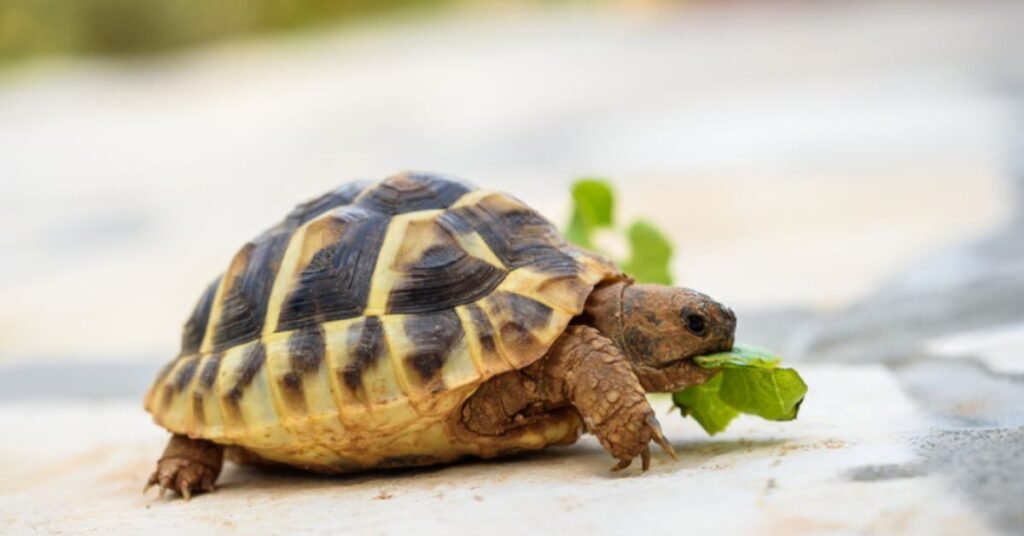Do turtles poop? It’s a question many new turtle owners find themselves asking. It may seem odd to many. Like any other living being, they also poop. You should keep a close eye on your turtle’s bowel movements to monitor its health and well-being. Turtle poop can reveal a lot about their diet, stress levels, and potential health issues.
During their active months (except hibernation), turtles regularly poop. The look and texture of their poop are usually consistent. If you understand turtles’ poop, what is expected and what isn’t?
You can catch early signs of problems and ensure your shelled friend stays happy and healthy. So, if you are looking for the answer ‘”do turtles poop” we have curated this for you a detailed insight into turtles’ poop.
Table of Contents
Do Turtles Poop?

Yes, turtles poop. Generally, baby turtles poop daily. On the other hand, adult turtles with shells over 4 inches long may poop every three to four days. If a juvenile turtle skips a day or two or an adult poops daily or less than once a week, it might signal a problem.
How Turtles Poop?
Now we know that turtles poop. So, how does their poop mechanism work? Let’s see –
Cloaca Functionality
The cloaca performs multiple functions in turtles, including excretion, urination, and reproduction. It collects waste from the intestines, urine from the kidneys, and reproductive cells. This multifunctional organ is crucial for turtle survival.
Digestive Process
Turtles’ digestive system starts with ingestion. They use their beaks to break down food. Aquatic turtles, due to their special salivary glands, need water to help them eat. Once food is ingested, it moves to the stomach, where digestion begins.
- Mouth to Stomach: Turtle eats, food enters the mouth, gets broken down by the beak, and travels to the stomach.
- Stomach to Intestines: After the stomach breaks down the food further, it is moved to the intestines, where it is broken down further.
- Intestines to Cloaca: Then the food is digested in the intestines, and waste moves to the cloaca for excretion.
More to Know
- Transit Time: The time food takes to pass through the digestive system varies based on diet, temperature, and hydration.
- Uric Acid: Terrestrial turtles excrete more uric acid, while aquatic turtles excrete more ammonia and urea.
What Turtle Poop Looks Like

To understand if your turtle’s poop is in the proper form or wrong, you have to know what a healthy turtle’s poop looks like –
Appearance and Texture
Healthy turtle poop is typically tiny, cylindrical, and dark in color, often brown or black. The texture ranges from firm to soft. Dry and hard poop may indicate dehydration, while watery stool could suggest gastrointestinal issues.
Frequency of Defecation
Adult turtles generally poop every 2-3 days, while juveniles may defecate daily. A week without defecation could indicate constipation. On the other hand, frequent defecation might signal a digestive problem.
A juvenile slider may poop every day, whereas an adult box turtle might poop every few days. So the basic details of turtles poop is typical in different turtle species.
More to Know
Here are some signs of turtles poop:
- Diet Indicators: Undigested food in turtle poop shows what type of diet they intake.
- Health Clues: Abnormal colors can indicate digestive problems or parasites.
- Behavioral Signs: Changes in poop patterns can signal stress or environmental changes.
What Factors Affects Turtle Poop?
To keep your turtle healthy, you have to know what factors can affect their poop disturbance.
Dietary Impact
Herbivores or omnivore turtles eat mostly plants or a mix of plants and meat poop more often and in more significant amounts. This is because their diet has a lot of fiber.
Carnivores turtles that eat mainly meat have smaller and less frequent poop. Their poop is usually darker and firmer because their diet is low in fiber and high in protein.
Environmental Factors
The temperature in a turtle’s habitat affects how they digest food and poop. Warmer temperatures make their metabolism faster, so they poop more often. Cooler temperatures slow down their digestion.
Also, aquatic turtles poop in the water. How much water they drink changes how their poop looks. If they drink a lot of water, their poop can be softer and looser. If they drink enough, it can be more accessible and more solid. Proper hydration helps their digestion and keeps them healthy.
Common Health Issues Related to Turtle Poop

There are some fundamental poop-related health issues in turtles:
Constipation
Let’s see how turtles are affected by constipation –
- Causes: Lack of fiber in the diet, dehydration, or low temperatures.
- Symptoms: Infrequent pooping, straining, swollen abdomen.
- Remedies: Balanced diet, fresh water, appropriate tank temperatures, warm water soaks.
Diarrhea
Diarrhea is another common problem.
- Causes: Dietary changes, infections, parasites, spoiled food, stress.
- Symptoms: Frequent, watery stool, lack of appetite, weight loss.
- Treatment: Rehydration, dietary adjustments, antibiotics, or antiparasitic medications as needed.
Parasites and Infections
Parasites and infections from unhealthy, dirty sources may also cause stomach problems.
- Causes: Parasites and infections can cause issues. These can come from dirty water or food.
- Symptoms: Look for diarrhea, blood in the poop, weight loss, or worms in the poop.
- Treatment: Collect a stool sample and take your turtle to the vet. They may need medicine to get rid of the parasites. Keeping their habitat clean is also essential.
Monitoring and Maintaining Healthy Turtle Poop
Monitoring your turtle’s poop helps spot health issues early. Healthy poop is semi-formed, brown or greenish, with a white chalky part called urate. If you notice changes in color, consistency, or frequency, it can signal problems.
What to Look For
- Color: Healthy poop is usually brown or greenish.
- Consistency: It should be semi-formed. Watery or very dry poop isn’t normal.
- Frequency: Turtles typically poop every 2-3 days.
Signs of Problems
- Diarrhea: Frequent, watery stools.
- Constipation: Infrequent pooping or straining.
- Unusual Content: Presence of worms or blood.
How Often Should Your Turtle poop?
Turtles usually pooh a few times a week. As we mentioned above, a healthy baby turtle should poop every day. Meanwhile, if your adult pet turtle poops every 3-4 days, there is no concern.
How often they go can depend on what they eat, their age, and their living conditions. If your turtle is healthy and eating well, it should poop regularly. If you notice any changes, it might be a good idea to check with a vet.
How To Ensure Healthy Digestion For Turtles?
A balanced diet and a clean habitat are essential to healthy digestion.
Balanced Diet
A balanced diet is one of the most crucial factors for maintaining the good health of your pet turtles.
- Fiber: Include leafy greens and vegetables for herbivorous turtles.
- Protein: Carnivorous turtles need protein-rich foods like insects and fish.
- Hydration: Ensure fresh water is always available.
Diet Tips:
Here are a few essential diet tips –
- Variety: Offer a mix of vegetables, fruits, and proteins.
- Portion Control: Avoid overfeeding. Feed turtles appropriate portions for their size and species.
- Clean Food: Remove uneaten food promptly to prevent contamination.
Habitat Management
It may not seem serious to you if you are a new pet owner. But the truth is that habitat management is the most important factor in pet turtle health.
- Clean Tank: Regularly clean the tank to prevent bacterial growth.
- Water Quality: Use a sound filtration system to keep water clean.
- Temperature: Maintain a suitable temperature range (usually between 75-85°F).
For example, soaking your turtle in warm water for 15-20 minutes can help stimulate its bowel movements. Some studies show that turtles in clean habitats with balanced diets have a 20-30% lower risk of digestive issues.
Personalized Care Tips
These are some essential care tips you should maintain for your pet turtle’s proper care.
- Regular Checks: Observe your turtle’s poop regularly for any changes.
- Hydration: Ensure fresh, clean water is always available.
- Vet Visits: Schedule annual check-ups to catch potential health issues early.
- Temperature Control: Keep the habitat at the right temperature to aid digestion.
FAQs
What Does Turtle Poop Look Like?
Turtle poop looks like a mixture of solids and semi-solids, usually dark brown or green. The texture can vary depending on the turtle’s diet. More fibrous poop indicates a vegetation-rich diet. If you notice any drastic changes in color, consistency, or smell, it might be a sign of a health issue, so it’s always good to keep an eye on it.
How Do Turtles Poop?
Turtles have an efficient digestive system that helps them extract nutrients from their food. Turtles poop through their cloaca, which they use for both excretion and reproduction. Like mammals, they do not have separate openings for urine and feces since everything exits through the cloaca.
Do Turtles Eat Their Poop?
Yes, some turtles do eat their poop, especially young turtles. This behavior, known as coprophagy, is quite common in many animals. It isn’t something to be overly concerned about. By eating their poop, turtles can re-digest their food, absorbing leftover nutrients. However, if you notice excessive coprophagy, it might indicate a nutritional deficiency, so it’s worth consulting a vet.
Read More: What Vegetables Do Box Turtles Eat?
Conclusion
The answer to the question, “do turtles poop?” is definitely yes. If you monitor your turtle’s poop, you’ll be able to spot health issues early. It’s a sign of a healthy diet and a well-maintained habitat if the poop is healthy.
In addition to fresh water, herbivore turtles require a diet high in fiber, and carnivores require a diet rich in protein. Also, a clean habitat reduces the risk of infections and digestive problems. So, to keep your pet turtle healthy, maintain these things.
